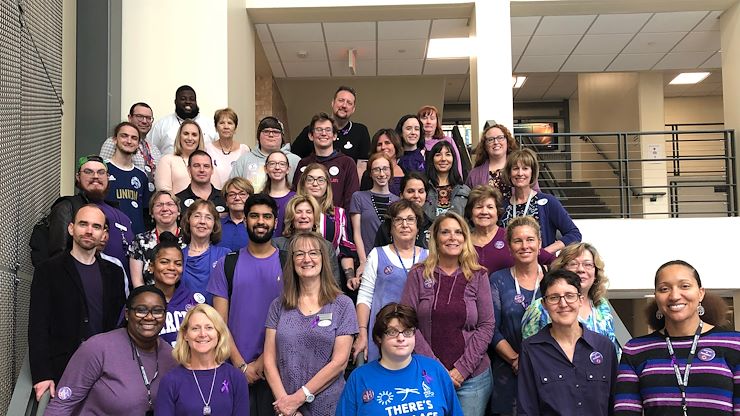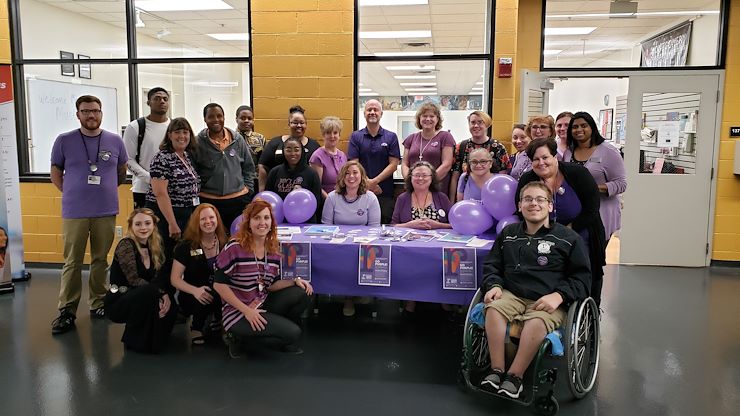
Montgomery County Community College employees and students wore purple and "Recovery is Possible" buttons on "Go Purple!" day to spread awareness about recovery.
Almost daily, the media covers stories on drug abuse, overdoses and the lives lost to addiction. While addiction continues to grow and often seems hopeless, recovery is possible and does happen.
Every September, the Substance Abuse and Mental Health Services Administration (SAMHSA) sponsors Recovery Month to increase awareness and understanding of mental and substance use disorders and celebrate the people who are in recovery.
Montgomery County Community College is helping to spread awareness about recovery. On Sept. 18, MCCC hosted a “Go Purple!” awareness event during which employees and students dressed in purple and wore “Recovery is Possible” buttons.

“One of the goals with this event is to break the stigma around substance abuse and recovery,” said MCCC Advisor Lori Davidson. “People in recovery often feel isolated. As a society we do a great job of sharing stories about those who don’t make it, but we don’t hear about the numbers of people who do practice recovery and live successful lives.”
MCCC graduate Ryan Schweiger is one of those success stories. On Sept. 5, he celebrated his 11th year in recovery. He currently works as a community outreach specialist for Penn Foundation Behavioral Health Services, a nonprofit organization based in Sellersville, Pa., that provides innovative services to address mental health and substance abuse treatments needs. MCCC works with Penn Foundation as a resource for students.
Schweiger earned his certificate in Human Services in Addictions at MCCC.
“During my practicum, my supervisor recommended I become a certified peer specialist because I was able to use my past experience to help others,” he said.
After becoming certified, he worked as a peer specialist for three years before he started working with the Penn Foundation. He then underwent additional training to become certified as a recovery specialist, too. His dual certifications enable him to help people who are in recovery for both mental health and addictions.
In his current role, he shares information about Penn Foundation, and he was recently at MCCC’s Wellness Fair in Pottstown.
“I’m trying to spread awareness in the community about Penn Foundation’s programs,” he said, noting that Penn Foundation helps about 19,000 people in recovery and their families per year.
“We have 27 rehabilitation programs located throughout Montgomery and Bucks Counties, including a satellite office in Pottstown,” Schweiger said. “We provide all types of support, including counseling, rehabilitation, vocation and residential services. We have a team approach.”
MCCC also has a team approach to assist students. In 2010, MCCC formed a Student Support and Referral Team to connect students to healthcare professionals and other community resources. Students can confidentially contact SSRT for themselves or on behalf of others. The SSRT includes Lori Davidson and Ed Brown at West Campus In Pottstown and Kristin Fulmer and Eileen Roth at Central Campus in Blue Bell.
MCCC also has a Wellness Walk-In program, where students can stop in and speak with SSRT staff about health and wellness concerns without an appointment.
“We want students to know there are resources available to help them. They don’t have to suffer alone,” said MCCC Advisor Eileen Roth. “In addition to counseling, there are tools students can use to develop coping skills, particularly with anxiety and depression.”
Starting this year, MCCC has a student support group, which is led by students with supervision by Fulmer and Roth. The group meets each Monday during downtime between 12:20 p.m. and 1:15 p.m. in Advanced Technology Center Room 316 at Central Campus. A student support group also will be started at West Campus. These groups are available in response to students' request for a support group led by their peers where they can share experiences.
Last year, MCCC became a member of the nonprofit organization, the JED Foundation, which helps schools enhance mental health and suicide prevention programs and systems on campus. MCCC is working with JED to offer additional resources for students.
To help students learn more about anxiety, depression and other conditions, MCCC has MindKare Behavioral Health Kiosks. The kiosk is an interactive, anonymous health-screening tool that provides general information about the signs and symptoms of treatable disorders and resources for local treatment options. Students can access the kiosks at both Central (College Hall) and West (South Hall) Campuses and online.
For individuals in mental health and substance abuse recovery, MCCC offers a Partnership on Work Enrichment and Readiness (POWER) program. This free, 14-week, two-credit course helps people successfully develop and reach their educational and career goals. The program focuses on career self-assessment, presentation skills, time management, computer basics, goal setting, resume and cover letter preparation and interview skills, among others. More than 550 students have graduated from the POWER program since it started in 2006.
Individuals interested in the POWER program may obtain a referral from their mental health or school provider or may self-refer. For more information, contact Community Liaison Lori Schreiber at 215-461-1151 or [email protected] or Director Lisa Barbiero at 215-641-6425 or [email protected].
